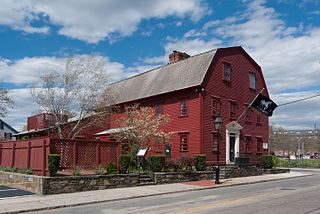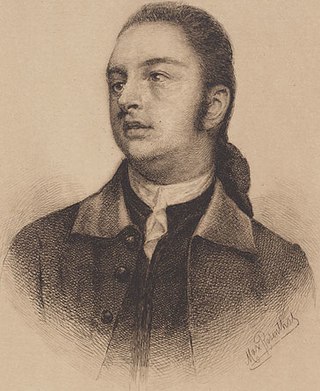
Rhode Island is a state in the New England region of the Northeastern United States. It borders Connecticut to its west; Massachusetts to its north and east; and the Atlantic Ocean to its south via Rhode Island Sound and Block Island Sound; and shares a small maritime border with New York, east of Long Island. Rhode Island is the smallest U.S. state by area and the seventh-least populous, with slightly more than 1.1 million residents as of 2024. The state's population, however, has continually recorded growth in every decennial census since 1790, and it is the second-most densely populated state after New Jersey. The state takes its name from the eponymous island, though nearly all its land area is on the mainland. Providence is its capital and most populous city.

Scituate is a town in Providence County, Rhode Island, United States. The population was 10,384 at the 2020 census.

Aquidneck Island, officially known as Rhode Island, is an island in Narragansett Bay in the state of Rhode Island. The total land area is 37.8 sq mi (98 km2), which makes it the largest island in the bay. The 2020 United States Census reported its population as 60,109. The state of Rhode Island is named after the island; the United States Board on Geographic Names recognizes Rhode Island as the name for the island, although it is widely referred to as Aquidneck Island in the state and by the island's residents.

The Mount Hope Bay raids were a series of military raids conducted by British troops during the American Revolutionary War against communities on the shores of Mount Hope Bay on May 25 and 31, 1778. The towns of Bristol and Warren, Rhode Island were significantly damaged, and Freetown, Massachusetts was also attacked, although its militia resisted British attacks more successfully. The British destroyed military defenses in the area, including supplies that had been cached by the Continental Army in anticipation of an assault on British-occupied Newport, Rhode Island. Homes as well as municipal and religious buildings were also destroyed in the raids.

Arthur Wallace Steere (1865–1943) was a Rhode Island politician and prominent businessman and landowner.

The history of Rhode Island is an overview of the Colony of Rhode Island and Providence Plantations and the state of Rhode Island from pre-colonial times to the present.

The Rhode Island Supreme Court is the court of last resort in the U.S. State of Rhode Island. The Court consists of a Chief Justice and four Associate Justices, all selected by the Governor of Rhode Island from candidates vetted by the Judicial Nominating Commission. Each justice enjoys lifetime tenure and no mandatory retirement age, similar to Federal judges. Justices may be removed only if impeached for improper conduct by a vote of the Rhode Island House of Representatives and convicted by trial in the Rhode Island Senate.

Jabez Bowen, Sr. was an American shipper, slave trader and politician. He was a militia colonel during the American Revolutionary War, and served as Deputy Governor of Rhode Island and chief justice of the Rhode Island Supreme Court.

Dwight Foster was an American lawyer and politician from Massachusetts. He served as Massachusetts Attorney General and was an associate justice of the Massachusetts Supreme Judicial Court.

The Country Party was a political party in Rhode Island in the Confederation and early Federal periods, from about March 1781 until the death in office of its leader, Governor Arthur Fenner, in October 1805. At its peak of influence, it controlled the Rhode Island General Assembly and dominated state politics from 1785 to 1790. A stridently Anti-Federalist party, it was instrumental in resisting ratification of the Constitution and was the organized vehicle for political expression of popular views that led to Rhode Island both disrupting consensus among states under the Articles of Confederation and being the last of the original 13 states to ratify the Constitution.

Henry Marchant was a Founding Father of the United States, an attorney general of Rhode Island, a delegate to the Second Continental Congress from Rhode Island, a signer of the Articles of Confederation, and the first United States district judge of the United States District Court for the District of Rhode Island.

William Wanton was a governor of the Colony of Rhode Island and Providence Plantations, serving a short term prior to his death. He spent most of his adult life in the civil and military service of the colony and commanded a sloop for chasing privateers.

William Greene Sr. was a governor of the Colony of Rhode Island and Providence Plantations. He was a clerk of the county court in Providence, deputy from Warwick, speaker of the Rhode Island Assembly, and then deputy governor from 1740 to 1743. He became governor for the first time in 1743 and served four separate terms for a total of 11 years, and died while in office during his final term.
George Gardiner, sometimes spelled Gardner, was an early inhabitant of Newport in the Colony of Rhode Island and Providence Plantations, and one of the original settlers of Aquidneck Island. He held some minor offices within the colony in the early 1640s, shortly after which he began a common-law marriage with Herodias (Long) Hicks, who came to live with him after separating from her first husband. This relationship lasted for nearly 20 years, after which Herodias petitioned the court to have Gardiner leave her alone, and she left Newport to go west of the Narragansett Bay and live with John Porter, a land-rich settler who was one of the original purchasers of the Pettaquamscutt lands.

William Greene Jr. was an American Statesman who served as the second governor of the state of Rhode Island, serving in this capacity for eight years, five of which were during the American Revolutionary War. From a prominent Rhode Island family, his father, William Greene Sr., had served 11 terms as a colonial governor of Rhode Island. His great-grandfather, John Greene Jr. served for ten years as deputy governor of the colony, and his great-great-grandfather, John Greene Sr. was a founding settler of both Providence and Warwick.

The 1837 Rhode Island gubernatorial election was held on April 19, 1837.

The 1817 Rhode Island gubernatorial election was held on April 16, 1817.

The 1816 Rhode Island gubernatorial election was held on April 17, 1816.

The 1815 Rhode Island gubernatorial election was held on April 19, 1815.

















